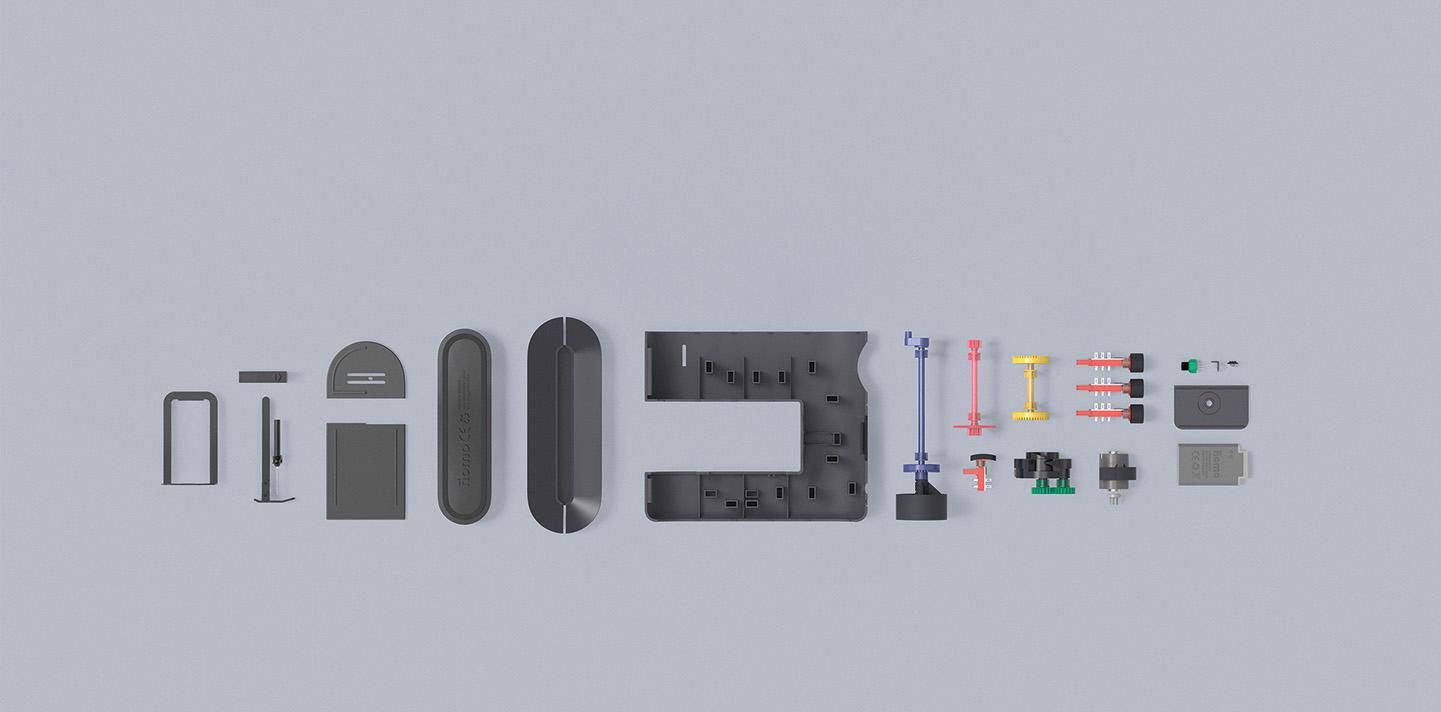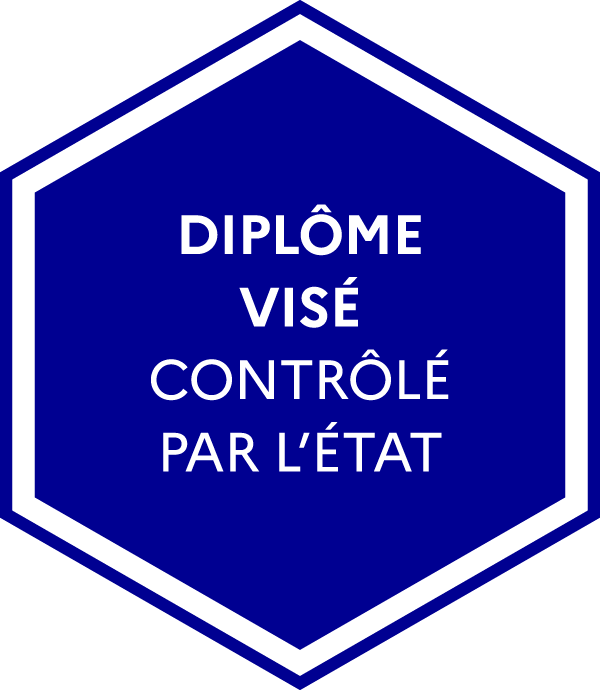

Industrial Design & Engineering Training
3 years to become ingenious designers by joining the vanguard of innovation with the Strate x ESILV double degree.
Become an Industrial Design & Engineering Manager with the RIDE double degree
At a time when technologies are evolving rapidly and crises are redefining the expectations of companies and communities, it is essential to reinvent the careers of those who will shape tomorrow's industry.
This double degree from Strate School of Design and ESILV - École Supérieure d'Ingénieurs Léonard de Vinci, offers a unique training program for Industrial Design & Engineering Managers (RIDE). This program is entirely in English.
This innovative 3-year program integrates engineering sciences, design, human and social sciences, and entrepreneurship to prepare future innovative creators to meet the complex challenges of our time.
Today's engineers solve specific technical problems, while designers conceive systemic solutions influencing quality of life and business trajectories.
By combining these two approaches, these ingenious designers acquire an integrated vision and the ability to make informed decisions in a changing industry. They develop the skills to design innovative solutions, lead innovation projects, and participate in research and development, combining technical excellence and creativity.
The Industrial Design & Engineering Manager program immerses students in real-world projects, in collaboration with experts in the field. It trains versatile, autonomous professionals, while stimulating their critical thinking and creativity. As a result, they become essential design engineering professionals, ready to shape a sustainable future!

Designer diploma approved and recognised by the Ministry of Higher Education and Research.
Diploma in Industrial Design from Strate School of Design, level 7, registered with the RNCP under number 38670 by decision of the Director General of France Compétences on February 16, 2023.
Program
The program is divided into four modules, each comprising theoretical courses and projects designed to reinforce the learning and application of academic concepts.
Module 1: Representation tools and design methods
- Focus: Learn to visualize and present the design idea effectively and concretely.
- Content: The course will cover the different techniques of representation and fabrication. Practical activities will enable students to apply these methods to product and interaction design results.
Module 2: Building an ethical framework through the human and social sciences
- Focus : Explore advanced notions of the human and social sciences in relation to the most complex problems.
- Content: Courses will integrate a scientific culture covering both the technical and human/social sciences, in order to build an ethical posture for designer-engineers.
Module 3: From tools to projects
- Focus: Emphasis on the practical application of tool learning to design projects.
- Content: Theoretical courses will deepen understanding of the tools introduced in Module 1, while introducing the design project management process. They will focus on the application of theory to practice.
Module 4: Dealing with complexity in the field
- Focus: Apply theoretical knowledge to real-life contexts.
- Content: Theoretical courses will provide perspectives on how to address complexity in real situations using systems thinking, foresight and visualization. Practical projects will involve working on real-life issues, enabling students to apply their learning in practical, impactful ways. These concepts will be further developed in the second year of the program.
Annual hours: 675 hours of teaching.
Semester 1:
- Focus: Consolidating major projects with industrial
- Content:
- Projects: Students will work on large-scale projects in collaboration with industry professionals. These projects aim to provide hands-on experience and reinforce understanding of real-world applications of design and engineering concepts.
- Tools and methods: The curriculum will continue, developing students' knowledge and skills in design and engineering tools and methods. This will include more complex and advanced techniques to prepare students for professional practice.
- Goal: To encourage autonomous learning by encouraging students to take greater responsibility for their projects and develop their problem-solving skills.
Semester 2:
- Focus: Opening up to the world and becoming more professional.
- Content:
- Semester abroad: each student has the opportunity to study at a partner school abroad. This experience provides exposure to a new educational environment, culture and approach to design and engineering.
- Projects et courses: the program will continue to emphasize the integration of design and engineering tools and methods,
- Goal: Offer students a global perspective and diversified experiences to prepare them to work in an international professional context.
Annual hourly volume: 358 teaching hours.
Term 1:
- Focus: Orienting and building your professional project.
- Content:
- Orientation: This term aims to orient students towards one of three possible career paths: research (academic or R&D), design/engineering, or entrepreneurship.
- Courses and workshops: Specialized courses and workshops will help students explore and identify their career choices.
- Goal: To help students make informed decisions about their future careers by exposing them to a variety of professional opportunities and perspectives.
Term 2:
- Focus: Diploma project (dissertation and project).
- Content:
- Diploma project: Students will focus on their diploma project, which includes both a written dissertation and a practical project.
- Supervision and mentoring: Students will receive guidance from school and industry professionals to develop and refine their diploma project.
- Diploma session: The term ends with students presenting their thesis and diploma project to an international jury.
- Goal: To enable students to demonstrate their expertise, creativity and professional preparation through complete, well-realized projects.
Term 3:
- Focus: Internship.
- Content:
- Internship placement: Students will undertake a final-year internship with a public or private company or organization.
- Professional experience: The internship aims to provide practical experience and concrete perspectives on the professional world.
- Mentoring: Students will be accompanied by mentors both within the organization and the schools to ensure a valuable learning experience.
- Goal: To prepare students for their professional careers by providing them with concrete experience and strengthening their links with industry.
Annual hours: 168 hours of teaching.
Training objectives
The educational objectives of the Industrial Design program are to enable learners to:
- Acquire and master expertise in the main fields of action of transport & mobility design in the face of current and future challenges, thanks to a multidisciplinary team and tailored training and programs,
- Apply a project-based approach thanks to a modular curriculum and flexible teaching methods tailored to real-life issues, including a significant proportion of courses in English,
- Integrate the humanities, social sciences and life sciences, taking a critical look at design to diagnose contemporary dysfunctions,
- Draw on research: benefit from the expertise of a team of researchers to integrate the latest advances in design into the curriculum,
- Adopt an ethical dimension to design, and become aware of the social and environmental responsibilities incumbent on future designers,
- Collaborate with a dynamic ecosystem and interact with a network of partners and companies to orient and enrich training in line with current design requirements.
The aim of the Design program is to train creative, multi-skilled professionals capable of devising innovative solutions in various fields of design. Upon completion, students will be able to:
- Implement advanced and specialized uses of digital tools
- Produce and mobilize highly specialized knowledge
- Implement specialized communication for knowledge transfer
- Contribute to transformation in a professional context
- Launch an industrial design project
- Identify and prototype creative solutions
- Design a product based on functional and technical choices
- Manage an industrial design project through to the rendering phase
- Face-to-face courses led by professional lecturers who are experts in their field,
- Simulated and real-life work placements, involving group and/or individual work on real-life orders submitted by partner organizations (companies, associations, local authorities, etc.),
- Individual coaching throughout the course, and particularly in the final year when students specialize and work on their diploma project,
- Empowerment through group work and collaboration, even on individual projects.
- Lectures by specialist speakers on subjects related to the curriculum.
The assessment procedures for the design curriculum are as follows:
- Continuous assessment
- Individual and group project-based assessments: reports and presentations
- Several work placements based on real or fictitious business cases
- Thesis presentation
- Individual end-of-study project, demonstrating the ability to implement a methodological process: investigation, testing, creative iteration, formalization and presentation of the project.
- Internships
Training key figures
3.8/5
95%
5/5
*"I find that Strate is a school that allows you to fully develop your creativity and technique through projects supervised by quality teachers and lecturers. As a 2nd year student, I love being able to use the workshops and all the tools at our disposal to shape my ideas and projects.”
Camille L.
Further studies
This program, which grants a level 7 certification, prepares you to enter the workforce at the Bac+5 level. However, if you wish to continue your studies for specialization and attain a higher level of responsibility, you can pursue a doctorate.
Jobs after training in Industrial Design & Engineering
Open configuration options
- Project manager in a design agency - Design Manager,
- Integrated designer in R&D centers,
- Product designer in industry.
In the public sector, our graduates can join structures of any size, responding to projects of any type.
In the private sector, our graduates can join studios and agencies of all sizes, or set up their own businesses.
The context of transition and reindustrialization will lead to changes in the needs and tensions of our professions over the next few years. This training program aims to anticipate the creation of new business sectors and new professions.
Diploma
Design diploma approved and recognized by the French Ministry of Higher Education and Research.
Title of Industrial Designer from Strate Ecole de Design Paris et Lyon - level 7, registered with the RNCP under number 38670 by decision of the Director General of France Compétences on February 16, 2023.
MSc Creative Technology from the École Supérieure d'Ingénieurs Léonard de Vinci.
Paris campus : 95% of students obtained their diploma - Class of 2024.
Lyon campus : 100% of students obtained their diploma - Class of 2024.
The course does not allow partial validation of one or more blocks.
Each block of skills can be capitalized. Validation of all blocks leads to certification.
To obtain certification, all identified skill blocks must be validated.
No equivalences.
There are no gateways for this diploma.
Admission procedures
You have a Bachelor's degree or a BUT specializing in technical professions (IT, mechanics, etc.) or another type of technical Bachelor's degree in design, architecture or applied art, with an interest in technology/engineering? You are fluent in English (courses are 100% taught in English) ? Then our parallel admissions program is for you.
- Admissions are based on a portfolio and a 45-minute individual interview.
- Applications, including a portfolio and cover letter, should be sent by e-mail.
Our admissions team will be with you every step of the way. We'll help you make your choices, put together your creative portfolio and even prepare for your interview! We carefully evaluate each application, taking into account your previous academic experience, your creativity and your motivation.
1st year: 12 500€
2nd year: 12 500€
3rd year: 12 500€
Application fee¹: 590€
Association fee² : 40€
Alumni association fee³ : 30€
Rates applicable for 2026-2027, subject to annual revision.
¹ Only the year of registration
² Mandatory annual subscription for Strate associations
³ Compulsory annual subscription for Strate alumni association
Practical information
Strate Contacts
- Strate double-diploma coordinator: Ioana Ocnarescu
- Admissions at Sèvres : Contacter
ESILV Contacts
- ESILV double-diploma coordinator : Marc Teyssier
- Admissions at l'ESILV
Do you have a recognized disability (RQTH) or specific learning needs? Strate is committed to supporting your success, whatever your situation.
An individual meeting will be offered to determine the adaptations and support you may need throughout your studies.
Your contact at Strate Paris:
- Votre contact à Strate Paris : Angélique Vente